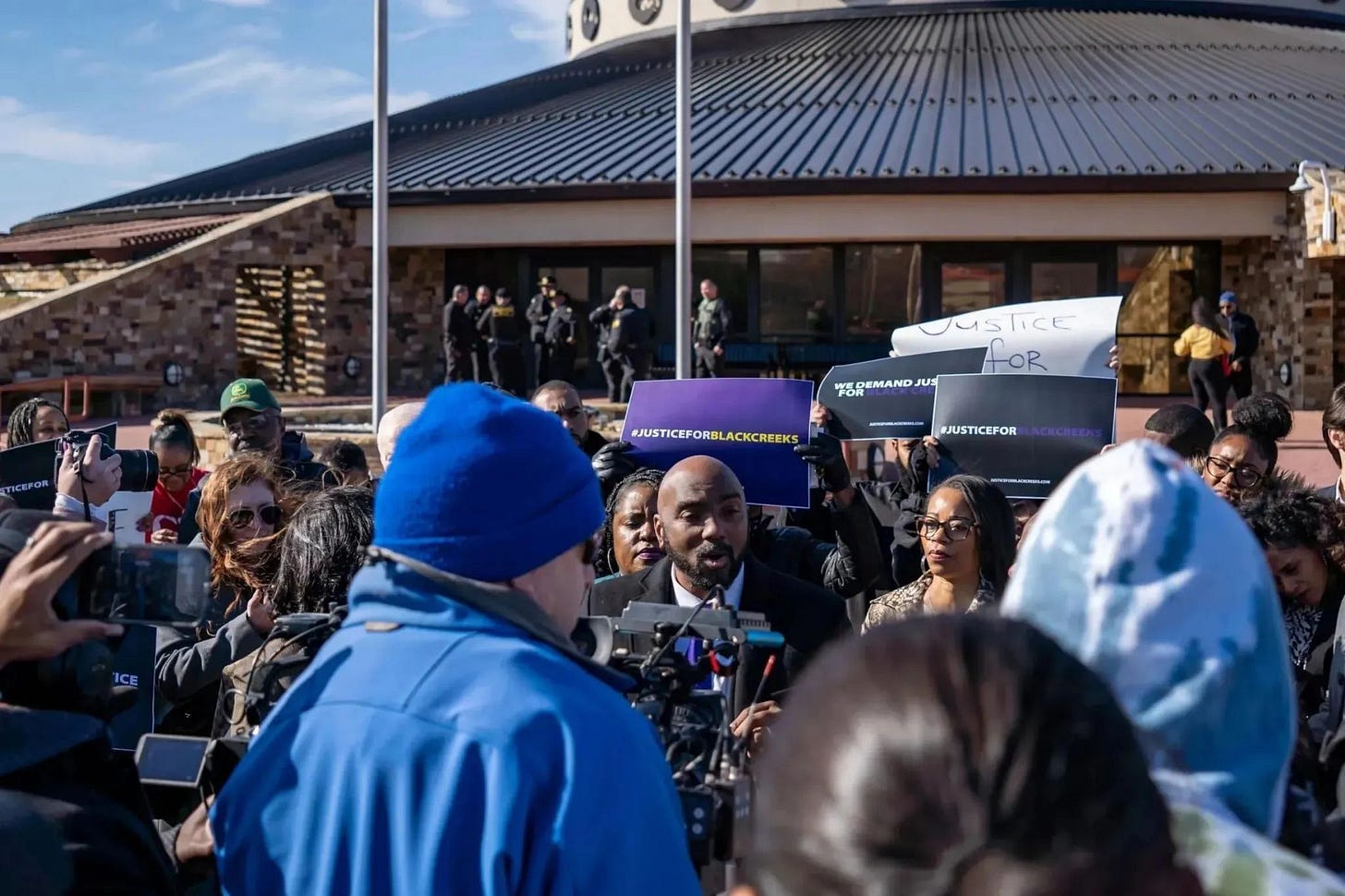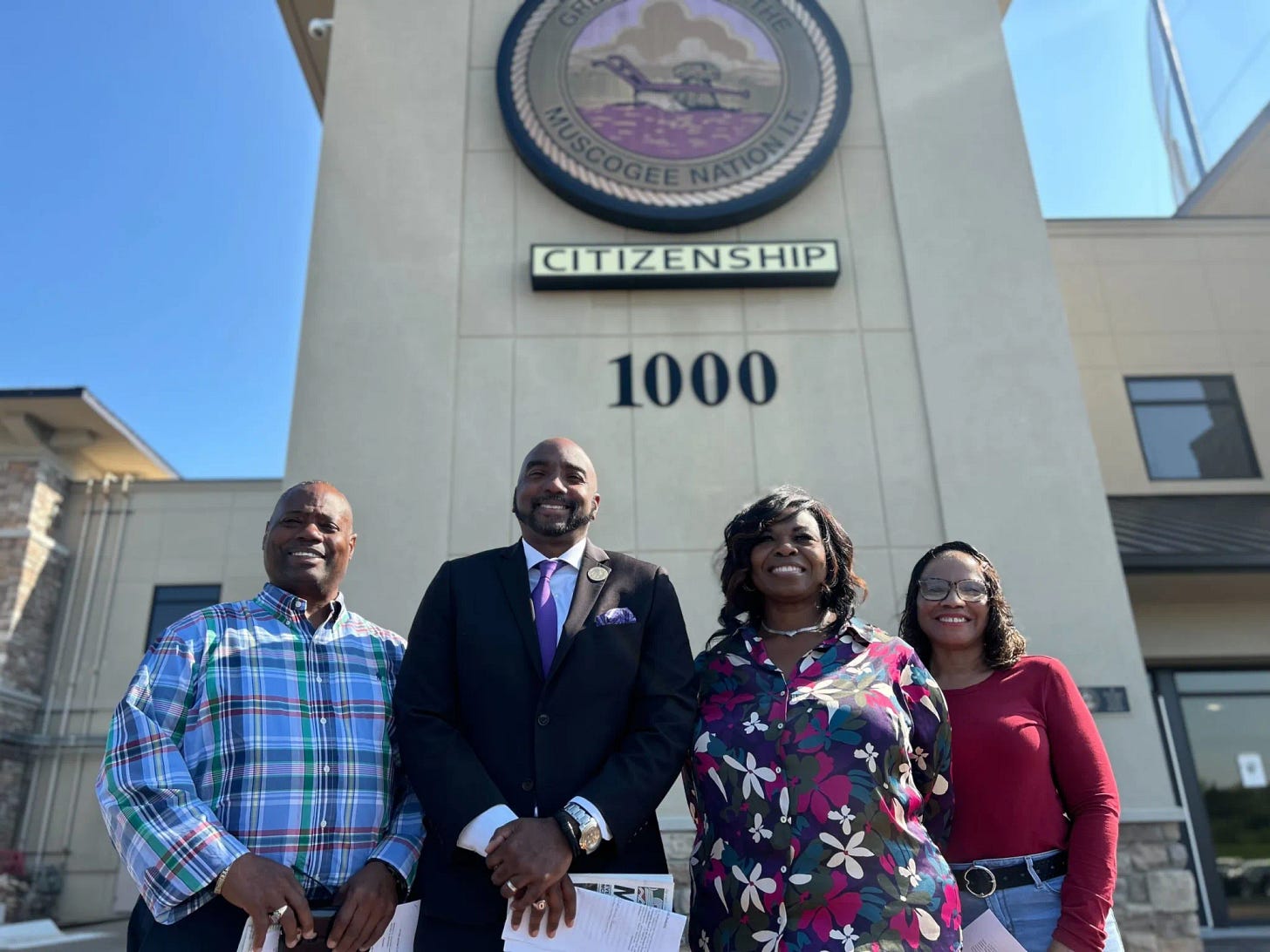Not Everyone Is Free on Juneteenth: Muscogee Nation vs. Freedmen Citizenship
Black Freedmen descendants of the Muscogee (Creek) Nation are still battling in court for rights their tribe promised in 1866 when it ended slavery.

Just five days before the last enslaved people in Texas learned of their freedom on June 19, 1865, (the origins of Juneteenth) the Muscogee (Creek) Nation signed the Treaty of 1866 with the U.S. government, promising to end slavery and provide equal rights and citizenship to Freedmen descendants whose ancestors were enslaved by the tribal nation.
Today, as we celebrate the liberation of the formerly enslaved, the Muscogee Nation is actively fighting to keep Black Creek Freedmen descendants out of the nation.
A district court has already ruled in September 2023 that Black Creeks who descend from the Freedmen Dawes Rolls are entitled to the same rights of citizenship as any other Creeks. I was there during the protests in Okmulgee, Oklahoma, the headquarters of the nation. And I was there during three days of a trial, during which Muscogee (Creek) Nation District Judge Denette Mouser ruled in favor of Black Creek Freedmen descendants.
Determined to keep segregation and racial apartheid in place, the Muscogee Nation Attorney General, under the direction of Principal Chief David Hill, has appealed the ruling to the Muscogee (Creek) Nation Supreme Court.
The two sides went through oral arguments on June 10, where several Justices appeared skeptical of allowing the tribal nation to ignore the clear language of the Treaty of 1866.

Rhonda Grayson is a plaintiff in the lawsuit seeking the restoration of her citizenship, which was denied to all Freedmen descendants in 1979 when the tribal nation signed a new Constitution denying Freedmen citizenship.
“I am incredibly pleased with the arguments presented by our attorneys. Throughout this process, they have done a fantastic job pursuing citizenship to reclaim our birthright as Muscogee people,” Grayson told me.
“Our attorneys focused on the law, specifically the Treaty of 1866. Attorney Jana Knott explained the Treaty in plain terms, stating that it has never been abrogated and remains the supreme law of the land. She pointed out that Article 2 guarantees that people of African descent and their descendants shall have and enjoy all the rights of native citizens.”
Meanwhile, out of the Five Tribes that practiced European-style slavery (Cherokee, Muscogee Creek, Choctaw, Chickasaw and Seminole) only the Cherokee Nation has fully embraced equal rights for their Freedmen descendant relatives.
As segregation and racial apartheid remain rampant among four of the Five “Civilized” Tribes, let us remember this day is about more than a celebration. It’s a reminder of our duty to keep fighting for liberation until we are ALL free.
Article 2 of the Treaty of 1866 between the United States and the Muscogee (Creek) Nation reads:
Slavery not to exist among the Creeks.
Rights of those of African descent.
The Creeks hereby covenant and agree that henceforth neither slavery nor involuntary servitude, otherwise than in the punishment of crimes, whereof the parties shall have been duly convicted in accordance with laws applicable to all members of said tribe, shall ever exist in said nation; and inasmuch as there are among the Creeks many persons of African descent, who have no interest in the soil, it is stipulated that hereafter these persons lawfully residing in said Creek country under their laws and usages, or who have been thus residing in said country, and may return within one year from the ratification of this treaty, and their descendants and such others of the same race as may be permitted by the laws of the said nation to settle within the limits of the jurisdiction of the Creek Nation as citizens [thereof,] shall have and enjoy all the rights and privileges of native citizens, including an equal interest in the soil and national funds, and the laws of the said nation shall be equally binding upon and give equal protection to all such persons, and all others, of whatsoever race or color, who may be adopted as citizens or members of said tribe.



